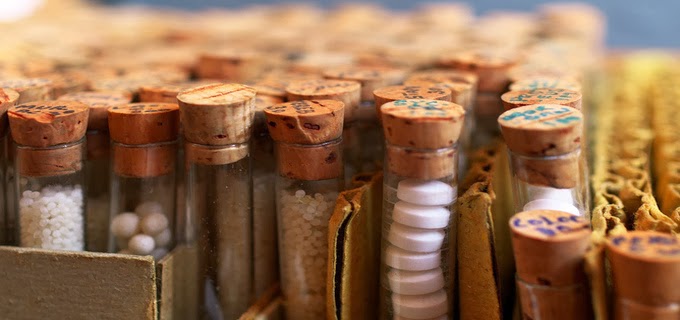Cocculus is famous for the treatment of vertigo. Vertigo results
from an imbalance of fluid in the deeper part of the ear (inner ear) or due to the
weakness of the vestibular nerve which carries the sensation of balance from
the ear to the brain. The resultant delay in nerve conduction results in
dizziness and the person cannot maintain balance. When the patient turns his
head one way or the other, the message about the movement does not reach the
brain promptly. Due to the weakness of the nervous system,
the physical efficiency and the efficiency of the brain is disturbed. The
patient feels tired and weak. Later, this weakness may turn into full-fledged
paralysis. The victims of this condition are usually people who become mentally
exhausted after taking care of their near and dear ones for a long time. They virtually remain awake day and night
and are in constant state of fear and anxiety. The resultant physical and
mental exhaustion will be cured by Cocculus.
This exhaustion usually does not affect midwives and
nurses because they take care of the patient as a part of their professional
duty. They do not have any direct personal relationship with the patient. Generally, their physical fatigue does not
convert into nervous tension..In the Cocculus patient, the body starts feeling weak as a
result of mental pressure, supplemented with physical exertion or
physical exertion with mental anxiety. The patient does not sleep
well. He is always in a state of anxiety and apprehension, which results
in headache. There is a tendency to develop vertigo, nausea and vomiting.
The symptoms get worse with movement. It further gets worse by stumbling during walking. The symptoms are
aggravated during travel. One must always keep Cocculus as the initial
treatment for imbalance
resulting from sudden motion. The skin of a chronic Cocculus patient shivers. The hands tremble when
picking up an object. There is loss of coordination in the movement of the limbs resulting in imbalance. The patients
cannot make a quick turn. They have to turn slowly to avoid
severe dizziness.
Some symptoms of Cocculus resemble those of Belladonna. In
Belladonna, the dizziness gets
worse with sudden motion but this is due to the variation in the pressure of
the blood towards the brain. In both Cocculus and Belladonna, a slight noise
and sudden jerk become unbearable. In both, the patient suffers from
sleeplessness and mental anguish. Unlike Belladonna, the face of a Cocculus
patient is of normal complexion and there is no unusual flow of blood towards
the face. In Cocculus the muscles become stiff and taut. To contract or stretch
the limbs causes severe pain.
In Cocculus, the patient feels severe colicky abdominal pain.
There is griping and
cramping over the stomach. Sometimes, the pain makes breathing
uncomfortable. Some women may actually become unconscious due to severe pain.
The patient dislikes food and their appetite disappears. In Cocculus, there is a delay in message relay from one point
to another. There is also a feeling of time passing rapidly. The legs become paralysed and
numb or insensitive. The background of this paralysis is a long period of
worrisome night vigil, problems and apprehension.
Due to mental
anguish and nervous exhaustion, the Cocculus patient answers
questions very slowly. He is lost in his own thoughts. He often gets severely
depressed. The head feels heavy. In addition Cocculus is useful in the
treatment of headache secondary
to heat exposure, like Belladonna and Glonoine. In Cocculus, the eyesight
becomes foggy, but this does not last long.Due to nervous weakness, it becomes blurred temporarily.
Mental fatigue is also
temporary. The inability to open the eyes, especially during night, due to
severe pain in the eyes, swollen eyelids or constriction
of the pupils, are also the symptoms of Cocculus. In Cocculus, there is a metallic taste in
the mouth, which is somewhat acidic. There is a feeling of acidity in the stomach along
with the tendency of nausea
and vomiting. In Cocculus, there are some symptoms similar to
malaria but the aches are only in the legs rather than the whole body. The fever associated with
nausea and vertigo will
respond to Cocculus In Cocculus the patient cannot bear the smell of food, which
in fact causes nausea. This symptom is also present in the case of Colchicum. Whenever
a gland is inflamed and enlarged,
the treatment could be Kreosotum or some other homoeopathic
remedies, but in Cocculus the swelling and inflammation is secondary
to paralysis.
Similarly, due to the paralysis of the intestines and the muscles of the abdomen,
the patient gets constipated and
finds it very difficult to expel the stools.
In women, the periods are either too frequent or much delayed and
continue for much longer. These symptoms are present in
other remedies also. For a proper diagnosis, the specific symptoms of Cocculus
must be kept in mind. If so found, Cocculus will be the ideal treatment. The
specific symptoms of Cocculus are generalized weakness, partial paralysis,
movement aggravating the symptoms, and delayed conduction of sensation along
the nerves. Copious watery discharge
in between the periods is specific to Cocculus. It gradually makes
the patient very weak, so much so that she talks with great difficulty. The
right and left hands become cold and hot alternately and can become numb also. Similarly,
the patient may have cold sweats alternately. A Cocculus patient cannot
tolerate gusty wind or the wind draft. He is oversensitive to both cold as well
as hot air. The symptoms aggravate in the open, sun and warm bedding, as well
as at nighttime. Generally Cocculus is used in potency 30 but when there is paralysis
of the lower half of the body, it needs to be given in potency CM, to be
repeated after a long period. This kind of paralysis is treatable with Cocculus
and only Cocculus; otherwise the patient remains untreated for life.





